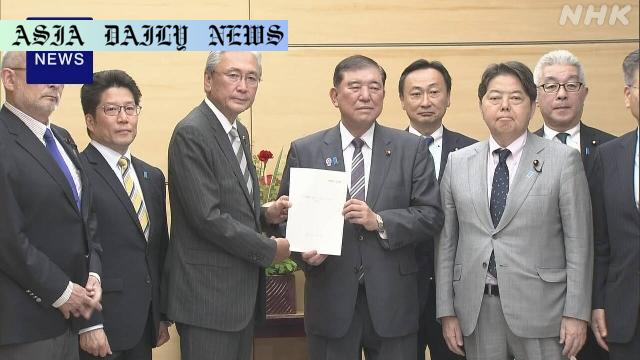Abduction Issue: Japan’s Prime Minister Ishiba Shigeru pledges utmost efforts to resolve issue with North Korea.
Japan’s PM Ishiba Shigeru met families of abducted citizens.
Highlighting sovereignty, Ishiba vows a global approach.
Relatives pushed for immediate diplomatic actions.

Understanding the Abduction Issue: A Critical Sovereignty Concern
The issue of Japanese citizens abducted by North Korea remains a deeply emotional and politically sensitive topic in Japan. Prime Minister Ishiba Shigeru recently reinforced his commitment to resolving this decades-long issue. Highlighting the significance of Japan’s sovereignty, Ishiba emphasized the need for Japan to play a leading role in addressing and ultimately resolving the matter. The Prime Minister met with relatives of the abducted citizens, who have been advocating tirelessly for concrete governmental action. Their persistence brings attention to not only the personal pain endured by families but also to ensuring that such violations of sovereignty do not go unaddressed on a global stage.
In his address, Ishiba acknowledged the unique burdens carried by families like the Yokotas, whose daughter, abducted at the tender age of 13, remains unaccounted for decades later. These cases are not isolated incidents but represent broader geopolitical and humanitarian challenges. The Japanese government recognizes 17 abductions perpetrated by North Korea during the 1970s and 1980s. Although five abductees returned following a historic 2002 summit, the fate of the remaining 12 remains unresolved. Such cases underscore the intricacies in negotiating with North Korea, a nation infamous for secrecy and political manipulation.
Engaging Stakeholders and International Cooperation
Prime Minister Ishiba’s meeting with the families also showcased a parallel emphasis on strengthening international alliances. The recent visit by the families to the United States extended their advocacy across borders, urging the global community to support their cause. Engaging with U.S. officials and Congress members signaled stronger multilateral approaches to pressuring North Korea. Ishiba, mindful of the sensitivity and urgency of the matter, assured families that diplomatic momentum will continue. The ultimate goal remains clear—concrete resolutions and retrieving answers regarding the 12 unresolved cases.
Ishiba highlighted how global understanding and support of the issue could play a pivotal role in addressing such human rights concerns. However, he also stressed that Japan must lead such efforts, anchored in the principle of sovereignty and humanitarian values. This sentiment reflects Japan’s determination to uphold justice for its citizens and ensure accountability for such violations on a global stage.
The Human Element: Families’ Calls for Swift Action
At the heart of the abduction issue are the families enduring years of uncertainty and pain. Takuya Yokota, brother of the abducted Megumi Yokota, voices his tireless demand for action, especially as time continues to pass. The aging of parents like Yokota Sakie—still yearning for her daughter’s return—adds an additional layer of urgency to the ongoing efforts. Families fear that prolonged delays might erode opportunities to uncover the truth and reunite with their loved ones during their lifetimes.
The human dimension of the issue resonates deeply, transcending political maneuvers. It highlights the universal need for compassion and justice. As Yokota Takuya expressed, the government’s diplomatic actions must align with the families’ desires for swift and tangible results. This intersection of emotion and policy insists that human rights violations cannot be ignored nor buried under the geopolitics of the region.



Commentary
Why the Abduction Issue Demands Global Attention
The unresolved abduction issue between Japan and North Korea is not just a national tragedy for the families directly impacted—it’s a human rights issue deserving urgent global attention. The plight of abducted citizens reminds us that the violation of individual freedoms affects not only those directly involved but also undermines principles of sovereignty and justice that bind the international community together. Prime Minister Ishiba Shigeru’s renewed commitment to this cause is noteworthy as it underscores the balance of national determination and worldwide collaboration in addressing humanitarian crises.
The Geopolitical and Emotional Significance
For decades, the tragic stories of abducted citizens and their families have been interwoven with political complexities. Resolving the captures of these 12 individuals is more than a diplomatic maneuver; it is about restoring dignity, accountability, and a sense of closure. That said, engaging international allies like the U.S. serves as a crucial element, not just in lending pressure on North Korea but in ensuring this challenge isn’t ignored on the global stage. These alliances bolster Japan’s ability to negotiate more effectively and gain widespread acknowledgment of its standing in human rights advocacy.
Urgent Action for Families and the Future
The fading years of relatives like Yokota Sakie reiterate the need for urgency. Governments often struggle with prioritizing such emotive issues amidst a variety of other pressing interests. However, prolonging or deferring action sullies the promises made to families, particularly when advanced age limits the window for resolutions. The unique combination of history, emotion, and diplomatic strategy here suggests that Japan’s ability to champion this cause successfully could serve as a symbol of strength and resilience.
Ultimately, the abduction issue reminds the international audience of the long-standing struggles tied to North Korea’s isolationist policies and contentious history. Resolving it demands collective compassion and dedication—not just from Japan but the entire global community. This is an opportunity to demonstrate that the rights and stories of individuals transcend even the most rigid geopolitical divide.